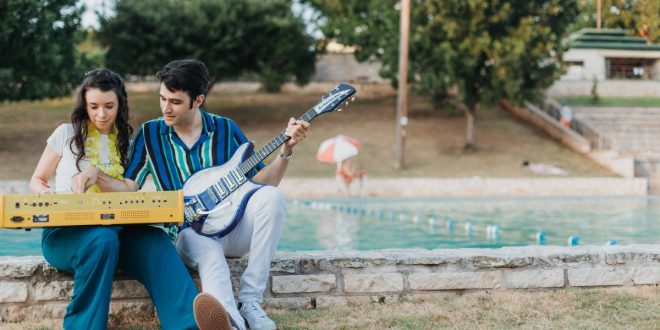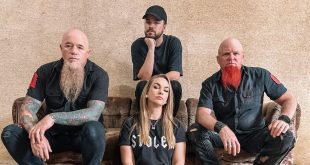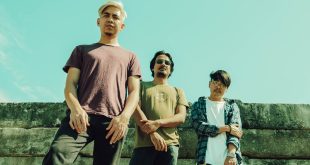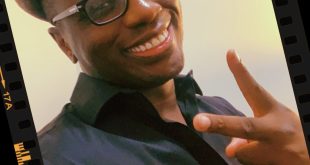Moonray is an Austin, Texas-based electronic act comprising newlywed husband and wife Jonray and Barbara Higginbotham. The duo finds common ground in their fascination for retro influences – a melding of 70s rock and 80s synthpop – as well as their purpose – a message based on love, light, and life. Their latest single, “Come Away,” has been gaining traction since its release in early September, which will be followed by an eventual full-length release titled Digital Moon.
I caught up with the band to discuss their musical backgrounds and chemistry with one another, as well as learn some helpful revelations they’ve come to discover during the songwriting process.
ME: Jonray – You grew up in Texas as a multi-instrumentalist. What was that environment like?
Jonray: Growing up, I was actually the only one in my family who played music. My mom didn’t play anything, but she saw that I was adapting quickly to music and would always get me different instruments. I played harmonica with Burt Wills at the age of 10, and eventually attended a music program at Rice University. I didn’t stick with it too long, though, but music has always had meaning in my life.
ME: With that background in mind, were you pretty much self-taught?
Jonray: Yeah! I mean, you teach yourself but at the same time, the outside world teaches you, too, because of its influence. I had a piano teacher at a young age who tried to teach me some theory for a while, but it didn’t work well. I think I tend to learn more from mentors — people that my mom was hanging out with, who would bring their guitar over and show me a lick or something. I’d also joined a band at school to learn woodwind instruments, so I’ve received a bit of training in that. But now, I’m taking more lessons than I ever had (laughs).
ME: So you keep that up, huh? That’s cool!
Jonray: Yup, always trying to polish my tools (laughs).
ME: When it came to your influences, which bands really helped shape your sound?
Jonray: Our sound that we have now with Moonray is shaped a lot by the 70s and 80s — stuff like Pink Floyd, Human League, Prince, and Madonna. Before that, I had a kind of folk rock sound on my own, but then Barbara rocked my world with the 80s music. Some people say it’s like that 70s/80s retro sound-meets-Flaming Lips.
ME: Barbara — let’s flip it over to you.
Barbara: So my musical environment was a little different from Jonray’s. I was brought up with music, but I also had both choir and piano lessons when I was younger, and did a lot of theater stuff. It wasn’t until I was in college that I studied piano as an elective, just because my parents wouldn’t allow me to get a degree in theater arts. Instead, I majored in business, and also paid for guitar lessons later on once I was working in hotels. At that point, I was a lot more interested in music. By the time I met Jonray, he was like, “Oh, you can play ‘this’,” and would teach me things here and there when it came to synth bass. Then all the stuff I’d learned in the past started coming back. I’ve been taking lessons for the past three years. I’ve taken guitar, mandolin, ukulele, and I’m actually taking violin lessons right now, since it’s an instrument I’d like to master one day.
ME: It’s awesome that both of you are essentially continuing to shape your sound. When it comes to performance, what can you assess about your stints in theater, and your live performances as a band?
Barbara: I mean, I’ve done theater in high school, but I will say that it’s different from performing music on stage. When you’re in theater, it’s like you’re encompassing a different character. We kind of do that when we play live, but at the same time, we’re playing our instruments, and we’re playing something that’s a little closer to our hearts.
Jonray: Yeah, we have this persona we try to embody that hits so close to home. It’s tough for us to act like that isn’t connected to our music.
ME: When you two initially got together, how soon was it before you started collaborating?
Jonray: Well, what’s funny is that we didn’t actually make music together until two years after we started dating. Barbara had wanted to go to law school and do a few other things. In the meantime, she was helping me with my own music; she put my CD package together and had given me input on some of my writing, telling me what she likes, but wasn’t really actively involved in that process. One day, I told her, “I don’t know why we’re not playing together. There’s no reason why you can’t work a monophonic synthesizer” (laughs). It was one note at a time, so I thought that would be less intimidating for her. Then, she was like, “Yeah, I can do one note!” Eventually, one note turned into two notes, and two notes became three. We started putting the polyphonic synth on top of the monophonic, and then she began doing some left and right-handed stuff.
I originally met Barbara a few months after I’d moved to Austin, and we’d just become inseparable since then. Not sure why we didn’t click with music at first, but now, it’s what we do every day (laughs)!
ME: I heard the name Moonray came about on a camping trip.
Jonray: Yes, it did! We were at…was it Inks Lake or Enchanted Rock?
Barbara: I think it was Inks Lake…
Jonray: Yeah, I think so too. We’d go back and forth there a lot when we first started dating, and we’ve been meaning to go back there.
Barbara: It was when we started playing the ukulele.
Jonray: Yup, we started playing ukulele, and we were enjoying ourselves very much in the middle of this big rock area. It was probably around three o’clock in the morning. You know how camping trips are, especially when you’re younger. We were exploring towns and enjoying our time together, just holding hands and talking about the moon. We were looking up at it like, “Man, you know, all of the moon’s light is coming from the sun. It’s a carrier of light, and it’s awesome because it brings a little of that light into darkness — like a beacon of hope — a moonray!” We’d been looking for a band name for a while, and we were already in the ballpark. My Great Grandmother was Marie Two Moon, a Native American from the Oglala Sioux Tribe. In fact, one of our first songs that we wrote, which we hadn’t released, was called “Two Moons”.
Barbara: I think we actually thought about naming the band Two Moons.
Jonray: Yeah, that’s right! We were rolling with that name for a while, but then we became Moonray. We want to be carriers of light too. In fact, one of our dreams is to start a charity where we bring musical instruments into the homes of troubled kids. We just want to write positive music, make people dance a little bit, and also keep the vibes going.
ME: That’s really cool! How I thought about it was Jonray kind of evolving into Moonray.
Jonray: Yeah (laughs)! Well, I actually sometimes call Barbara my moon, so it’s also like a combination of our two names.
ME: Hey, that works!
Jonray: Yeah, it’s multifaceted (laughs)!
ME: Now, your debut single was “Hand of Queens,” is that right?
Jonray: Yes, that’s correct. That song has Johnny Radelat on it — Gary Clark Jr’s drummer.
ME: How did the song, as well as working with Johnny, come about?
Jonray: With that song, we originally had multiple versions of it, and it started with an idea I had when I got my first loop pedal four or five years ago. We had it mixed at another studio down the road, and when listening back, it just wasn’t the right composition. We were still exploring, trying things like a VP-330 vocoder, and Barb and I concluded that it’s an element of our sound; we needed to have it. This past year, we’d really started putting it together, but it had really been a thorn on our side trying to get it the way we wanted.
Barbara: We have been working on our sound for like four years now.
Jonray: Yup, four years. That’s why the song sounds so experimental, and kind of a thorn for us, because we’ve heard it so many different ways.
Barbara: Live, we play it differently.
Jonray: Yup, when we play it live, it’s more electro-pop. But yeah, in getting to know Johnny, we saw as him playing with the reggae band Don Chani — one of our favorite local bands. We were just really blown away by his playing; I didn’t know he played with Gary before. After the show, when we went over and talked with him, some girl just told us, “Do you even know who he is? You can’t just go up and talk to him.” But he told her “Ahh, get outta here,” and then we chatted with him for a good 30 minutes. Then, we brought up the idea of him drumming on one of our tracks. On our new album, Digital Moon, he actually drums on seven tracks. We don’t know when the album will be released because we want it to be perfect, but yeah, “Hand of Queens” was our first official release, and it worked out really well. Johnny really enjoyed it and mentioned that he normally plays an acoustic kit, so it was a cool change for him to be playing an electronic Roland kit; he really dug it.
ME: Compared to the repeated experimentation of “Hand of Queens,” was “Come Away” one of those songs that turned out a lot smoother?
Jonray: Yeah! With “Come Away,” the lyrics came together right after I proposed to Barbara, and they’re kind of in their own place. The arrangement came together in San Francisco through assembling a bunch of midi files. It came across as a great little tune we could make something of one day. After we got engaged, we finished the lyrics, and yeah, the song came together fairly quickly.
ME: All you needed was that assurance of love.
Jonray: Yeah, that was like the missing piece.
ME: The cover art reminds me of something that would accompany the racing game OutRun — very 80s.
Jonray: That’s cool! Yeah, Barbara did the cover art. It was actually a photo of us that was part of a collage of images that she liked.
Barbara: Actually, I think we wanted to make a picture out of a moon that I took.
Jonray: Yeah, we like to add moons to things, of course (laughs). She took a picture of the moon when we were in Enchanted Rock, then photoshopped that out and added it to the cover. It’s amazing what you could do with phones these days.
ME: There’s definitely a tone of nostalgia in the saturated color scheme. When I listen to music, I think of it as complementary to the colors of the album art.
Barbara: That’s really cool.
Jonray: Absolutely! When you think of music tones matching the colors of a cover, I think it’s definitely connected.
Barbara: I work really well with colors.
Jonray: She does. I’m kind of colorblind, though; I don’t see certain colors the same way most people can, so I let her take the lead on that (laughs)!
ME: With these songs that are in incubation, did you produce them yourself?
Jonray: Yes, that’s correct. Some of the songs will feature some co-production by Eric Sarafin, in terms of polishing them up and making them sound more wet or dry. He’s a writer too — goes under the name The Mixerman — and has written books like Zen In The Art Of Mixing, and Zen In The Art Of Production. He’s a really talented guy.
ME: Overall, what have you learned about yourselves?
Jonray: A ton of stuff (laughs). With Barbara, luckily, I know that if we can write songs together and travel together, we must be pretty well-rounded. Although, we do get into some…polite…heated arguments on which drum machine to use (laughs)!
Barbara: Yup!
Jonray: Yeah. I’d be like, “Trust me, we gotta use the 808,” and she’d be like, “Nope, it needs to be the Lindrum!” Most of the time, she’s right, and sometimes I am too (laughs). We always tell each other that we can try it, and if it doesn’t work, we can always change it. That’s the beauty of working with midi files — you can transpose the drum midi, and if you don’t like it, you can just send it of over to the other drum machine. But we find out a lot about ourselves. I think your subconscious knows more information than your conscious mind. Whether you write free form or even with the cut-out technique, it ends up doing some of the writing, and then when you piece it together later on, you can see clearer what you wrote about. It’s a weird process, but it connects more and more.
Barbara: Sometimes, we’ll stop working on a song, and then once we go on a drive or a trip, we’ll be like, “Ah!”
Jonray: Yeah, it somehow tells you why the lyrics came out the way they did. With some of our songs, we’ll improvise and practice freestyle singing over a four-bar loop. Then, we go back and write the lyrics down. If we’re stuck, we use a cut-out technique where we store words from magazines. You’d be surprised what you can come up with, when you sing throughout the day and keep picking out words to use for lyrics. I think it’s also good for writer’s block, and it’s kind of how David Bowie wrote a lot of his material.
ME: That’s a really cool technique, and I like what Barbara brought up too. Sometimes it’s necessary to leave the house and experience nature in order to flesh out these songs, rather than be holed up in the same spot.
Jonray: It is, and I fight Barbara on that sometimes, because I’m fine with being a hermit – staying in the studio, working on songs, and standing up straight for 12 hours at a time (laughs). But yeah, when you’re working on a melody, and you’ve heard it over and over again in your head and are trying to play it, it just doesn’t settle. Once you step out, though, the notes begin to settle, and then by the time you’re distracted, you’ll start humming the melody the right way. It’s weird, but pretty cool.
Barbara: I think there’s a way your subconscious is always working continuously. We don’t know, but I’m sure there are people in the back of my brain filing stuff away.
Jonray: Yeah, I’m convinced that she’s got a whole system of hamsters on wheels back there – you know, these lightning hamsters.
ME: Or maybe something like Osmosis Jones.
Both: (Laughs)!
ME: I guess, at the end of the day, you grow regardless.
Jonray: Yes, we do, and with our music, we really want it to be an imprint of who we are during that time. That’s what happens when you’d spend time on a single song for over two years. You can initially write the song and have all the emotion, but it wouldn’t make sense to just hurry up and finish it. Honestly, it has to take on new forms. Over time, it kind of jumps up to your current situation, and you still have to make it relate somehow. We’re made up of all our past and current experiences, and I think with music, it’s the same way.
ME: Lastly, anything you’d like to say to your fans?
Jonray: We’d like to say how thankful we are for them liking our music, and the nice messages we’ve been getting from on our new song – how they connect with it and it makes them smile. That makes us smile, and hopefully it makes everyone else happy, too.
Barbara: Hopefully it makes them dance!
Jonray: Yeah, that’s true!
Moonray Socials:
 Music Existence Because of Music, We Exist
Music Existence Because of Music, We Exist



